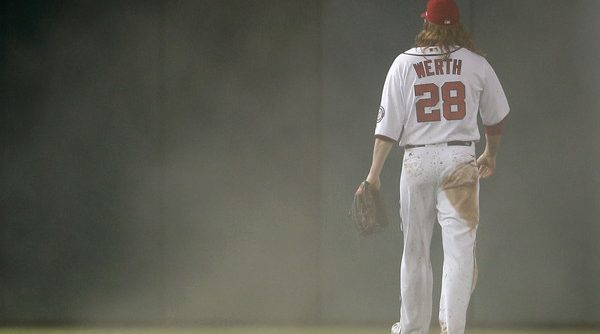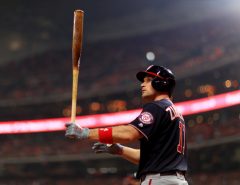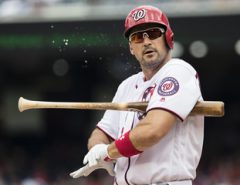The Golden Age of Washington Nationals baseball began in the winter of 2010. Out of the blue and in the dead of night, the Nats gave their first one-hundred million dollar contract to Jayson Werth. The words “potentially burdensome” were used in the first paragraph of Adam Kilgore’s write-up to describe the 7 year, $126M deal in the Washington Post. Everyone expects now, as they expected then, that Werth’s tenure with the club will end when that contract comes to an end at the end of the season.
Kilgore quotes Mike Rizzo as saying at the time:
“I think anyone is a little uncomfortable with giving anyone a seven-year deal,” Rizzo said. “But we’re in a position with the Washington Nationals at this place and this time that we have to do a little bit more than the championship-caliber, win-today teams. I think that it’s kind of a two-fold process. Sometimes you have to give the years to get the player. We feel, with that said, this is the type of guy to give a long-term deal with. He takes such good care of his body. Our evaluators have seen him improve the last three years to a point where we still his best days are still ahead of him.”
The Nats gave the 7th year – this year – to Werth because they had to. The Red Sox needed an outfielder that offseason and preferred Werth over Carl Crawford. It’s presumed that they were prepared to give Werth a 6-year deal for near the same annual salary the Nats gave him: $18M a year. So Rizzo countered with the seventh year to get the deal down. Boston then signed the younger Crawford for $142M over 7 years, in what was seen as one of the better free agent signings of the 2010 offseason.
An extra year and another $18M was the price for a team coming off 5 straight losing seasons. Now here we are in that extra year, and Werth is still contributing to the league’s highest scoring offense, as the Nats go for their 4th division title in 6 years. There is no denying that Werth made the Nats a winner, but he is also living up to Rizzo’s words from the winter of 2010 by having his best season since his best season in 2014. Rizzo predicted he’d continue to improve, and he did.
-
2014 Jayson Werth – .292/.394/.455, 141 wRC+, 5.0 WAR in 147 games
-
2017 Jayson Werth – .287/.387/.477, 124 wRC+, 0.8 WAR in 36 games
A look at this Fangraph’s page shows a lot of similarities between his best year at the plate and this year. He’s walking at about the same rate. His strikeouts are up but so is his power. His defense has predictably fallen over the years. He’s on track for 3 wins, which would give him a total of 16.5 wins for the life of the contract. Fangraphs estimates that he’s earned $106.4M as of this week and is on his way to totaling around $124M as a Nat. So if Werth can continue to have the bounce-back season he’s had so far, he’ll have earned 98% of a deal seen as an overpay by everyone–including the man who paid it. This comes despite missing 81 and 74 games in 2012 and 2015 respectively due to injury. (Insert Werth-it pun here.)
So why not bring him back for one more year?
In an earlier post, I argued that the Nats should do whatever it takes to make a championship push, even if that means trading Victor Robles in the right deal. Robles is seen heir-apparent to Werth’s outfield starting spot. He can play center, so the team could move Eaton to left if they wanted. However, he’s only in Single-A and there’s no guarantee he’s going to be ready for April 2018, whether he’s hindered by performance or injury. Let’s say all goes well and he gets a promotion to AA in the next month or so, which leads to a September call-up to the majors. I’d think the Nats would still be in the market for a free agent 4th outfielder who’s a borderline starter on a one-year deal. Even a one-win player would be worth $8-10 million on the free agent market, similar to what Ian Desmond signed two years ago in Texas and what Matt Wieters signed this year in DC. So why not Werth?
He’s a leader in the clubhouse (despite there being a player with longer tenure in Ryan Zimmerman) and this season is showing he’s still capable of positive contributions. As a free agent, I think Werth knows he’ll be taking a pay cut from the $21M he’s earning this year and the $18M yearly average of his last deal, even if he does have a 3+ win season. He’ll turn 39 next year and has a recent history of injury (2015) and declined production (2016).
I like to think of the Qualifying Offer as a sort of minimum wage for pending free agents. The Qualifying Offer is a one-year price set by the league that teams can offer their out-going free agents. If the player declines it then the team receives a draft pick as compensation. The 2016-2017 QO was set at $17.2M and has steadily risen since it’s inception in 2013 when it was set at $13.3M. My guess is that the QO will be close, if not over, $18M next year. I don’t believe he’s worth that much, and I’m sure the Nats and even Werth himself don’t either. A 3-win season worth $24M in dollars-to-win money, shows he’s still capable of producing. But due to “earning” a combined $5.7M between 2015 and ’16, his three-year total would only average to just under $10M a year.
Which brings us back into the market where the Nats should be looking: a one-year, one-win outfielder to cover themselves in case Robles isn’t ready or struggles. Maybe the team would rather pay $5M a year for that guy, but I think it’d be worth a few extra million, if that’s what it took, to keep Werth around to maintain clubhouse continuity. Paying $8M a year isn’t so much that it would be a problem if you benched him for Robles because I’d imagine he’d be a valuable pinch-hitter. If the team does trade Robles, then $8M a year would be bargain compared to a QO-level player for a one-year stop gap until they find a longer term solution.
Let’s say our wildest dreams come true and the Nats trade for Lorenzo Cain, or some other outfielder that helps the team this year and next, AND manage to do it without trading Robles. I’d then hope the Nats would at least offer Werth a lower base salary with incentives. Adam Lind has a $5M option for next year, for example, so it seems fair for Werth. The incentives could get him closer to $8M.
The Nationals gave Jayson Werth a lot of money to be a major contributor and create a winning culture. Werth has succeeded on both accounts. He might be able get more money and playing time DH’ing in the American League, but I think a $5M-plus-incentives offer would be something he would strongly consider to stay with a team, and in a city, he seems to love–especially if it’s offered before the season is over. Paying $5M is not too much when considering his leadership and availability for critical pinch-hit at-bats. And if he’s healthy and the Nats need him to start, $8M would be a bargain.
He’s earning his current contract, so why not give him another? I truly believe if the Nats make Werth a fair offer, he’d accept. I just hope we get to find out.
Tags: Adam Lind, Jayson Werth, Lorenzo Cain, Nationals, Nats, Victor Robles, Washington Nationals





I think his leadership is valuable as well. It seems a lot of guys in his shoes want a two year deal with a team option.
I couldn’t disagree more. Nats could have acquired the closer now needed for Werth’s ridiculously high salary. I cringe every time a ball is hit to left field. Who remembers Werth throwing out a runner at the plate?
Terribly overrated base running and a defensive liability. The only thing he truly excels at is plate approach.
He has not contributed to a winning culture when it counts; in the postseason.